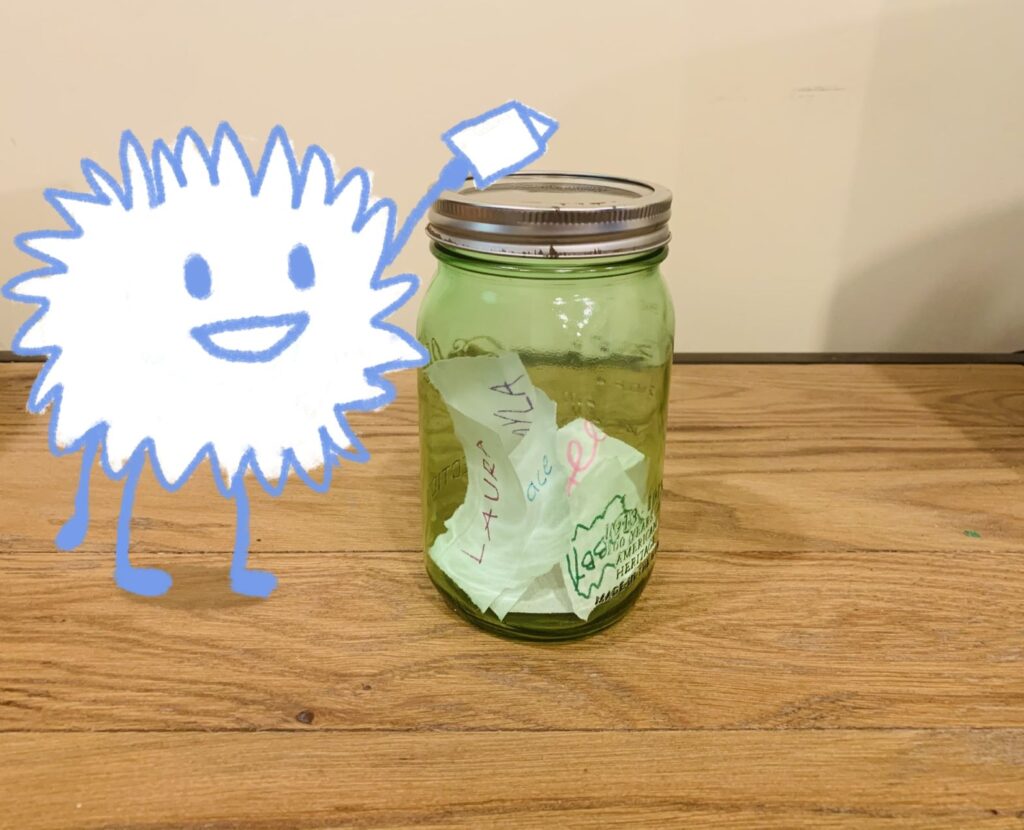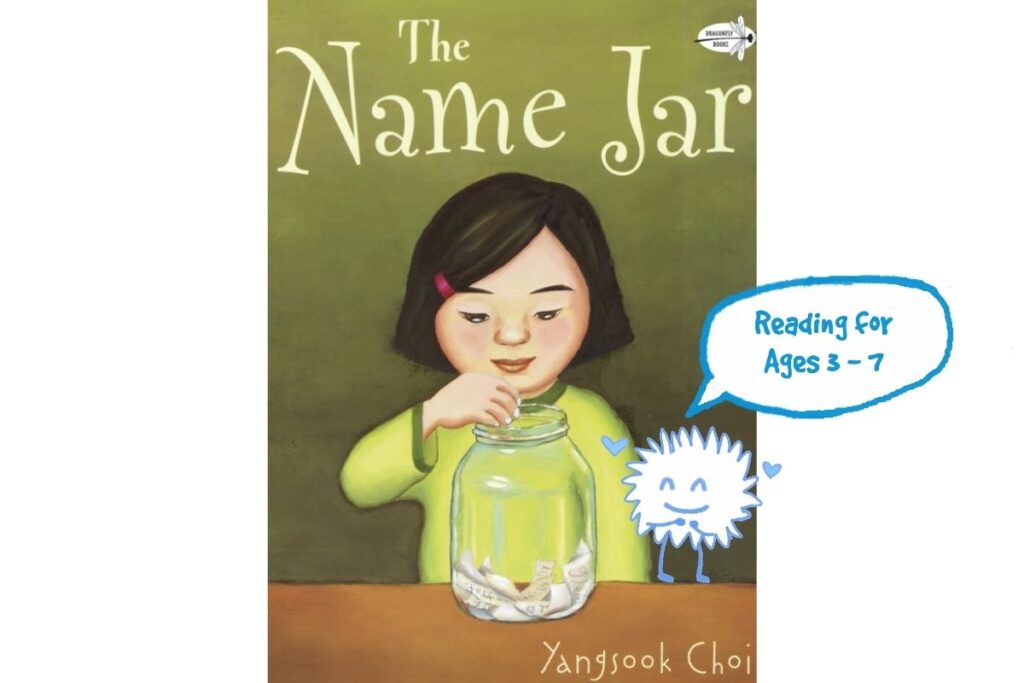I read The Name Jar by Yangsook Choi read many years ago and at the time, I thought the book to be old-fashioned and slow. I was recently reminded of the book when my friend told me her parents anglicized their Korean last name upon immigrating to New York – not an unusual practice for immigrants trying to assimilate.
I picked the book up again and realized that though The Name Jar was published over 20 years ago, the story of a girl with a Korean name thinking of adopting an American name still resonates today.
I had a stack of books to be my first book review. I rewrote this post countless times. As important as it is to continually blog new content, I could not get past The Name Jar.
I wanted my first book review to be special. This book represents the kind of books I want to share. Reading this book inspires our own stories to better understand each other.
I recommend reading The Name Jar to empathize with the nervousness and anxiety of a little girl arriving in a new country and school. I recommend reading The Name Jar to follow through her journey and be inspired to share your own story without knowing how it’ll be received but do it anyway because it’s who you are.
I mentioned the book may seem slow because it has more text than a typical picture book. I thought the book was old-fashioned because the dialogue is more formal for a book reading and not necessarily written casually like in a real conversation.
If you stay patient, you may not get it right away, but the story will stay with you like me. A sign of a strong storyteller! Keep reading for the book summary and my additional reasons to read the book.

Summary of The Name Jar
Unhei, who had just moved from Korea, rode the school bus to her first school day. On the way, kids immediately made fun of Unhei’s foreign name.
In the classroom, troubled by the bus ride, Unhei was intimidated to introduce herself. Instead, Unhei announced her name had not yet been chosen. The class was fascinated.
Wanting to be part of the intrigue, the class created a name jar. The jar was filled with American name suggestions written on little pieces of paper.
Unhei tells her mother she considers an American name, and her mother is surprised. Unhei was carefully chosen for her. Her family thought the name to be special. Upon leaving Korea, Unhei’s grandmother gifted her a dojang, a stamp of Unhei’s name meant to be her seal.
Unhei realized her name was important to her family and also to her. With newly-founded confidence, Unhei finally introduces herself to the class. She teaches her friends that Unhei, pronounced Yoon-hye, means grace.

Why Read? To Share These 3 Korean Cultures
Readers of all ages can relate to the different themes of this book, like going to a new school, immigrating from a different country or making new friends. For me, this book inspired my stories of growing up as a Korean-American. The Name Jar these reminded me of these 3 Korean cultures from my life.
1. Korean Names
Growing up, many friends adopted more commonplace names if their Korean names were too hard to pronounce by English speakers. My dad used an American name because it was easier for him to change than expect others to learn.
I remember when my dad decided to use an American name rather than his Korean name. A man we only met once thought it’d be OK to randomly call my dad “Mike” since my dad’s real name, Myung, was too hard for him to pronounce.
At the time, I was young and didn’t think much about it. Even for me, as a Korean-American, I don’t always understand or properly pronounce Korean names. Sometimes it is easier not to try.
Unhei’s story reminded me that Korean names are special and should be honored. Koreans often choose names to guide the fate of the child. Each character of the name has a meaning to bless the future of the child. It’s not uncommon for parents to spend a lot of time (and sometimes money) in choosing the most perfect name.

2. Immigrating from Korea
When I read The Name Jar years ago, I thought it old-fashioned. It seemed another generic story about a Korean immigrant not fitting in with Americans.
Now many years older, especially as a parent, I realize there should be MORE children’s stories about the Korean-American experience. It’s the stories and books that help us understand each other.
Just as it was for me in the 80s, my son is teased for his slanted eyes and called “weird” for learning Korean. How is this possible given how much more we know about the world?
There will never be enough stories about different cultures because they’re as unique and plentiful as the individuals. I’m grateful for the authors who share experiences I may not have otherwise known or forgotten.
3. Make the Effort to Share and Learn Experiences
Despite being teased, Unhei was motivated to teach the class about her Korean name. Presenting is nerve-racking enough without adding the anxiety of being ridiculed again.
Unhei didn’t have to go in front of her class. I thought about the girls I knew who didn’t speak English. They were usually very quiet in the classroom, which I understood. It’s an effort to explain your perspective. It’s much easier staying within the comfort zone of people who don’t need the explanation.
Unhei must have felt it was important for her new friends to understand her culture. It wasn’t enough to be proud; Unhei wanted to share. Even if not everyone gets it, the effort is important and meaningful.

Related Titles
Thank you for reading my book review! The Name Jar is part of my Book List “About Korean-American Girls.” Check my other books reviews:
- Stand Up, Yumi Chung by Jessica Kim
- Danbi Leads the School Parade by Anna Kim
- No Kimchi for Me! by Aram Kim
Art Credits
- @fritaketchup on Instagram
- miniwide on Shutterstoc
How to Read The Name Jar by Yangsook Choi
Support Independent Bookstores!
My favorite local booksellers are Green Apple Books and Books, Inc. They ship within the US. If you have a local favorite, go to yours!
Amazon
It is hard to beat the accessibility and service, so for your convenience, here's the Amazon link.😀


Thank you for sharing your story. I almost changed my name, but ultimately decided to keep my given name.
Thanks, SK! Since I’ve posted, many friends have told me their name story. Thank you for sharing!